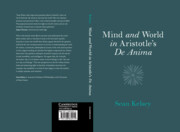4 - Affinities
from Part II - Angles
Published online by Cambridge University Press: 16 December 2021
Summary
Aristotle represents many of his predecessors as having arrived at their views about psuchē from reflection on the fact that knowledge is of beings; it is this fact, together with the principle that knowledge is “like by like,” which led them to the view that psuchē is an amalgam of the elements of all beings. But though Aristotle thinks little of this view, he accepts the considerations (duly qualified) from which it is derived. Now, the principle that knowledge is “like by like” is an explanatory principle; it locates the “cause” of knowledge in an antecedent likeness between its subjects and objects. Moreover, analogous principles have been offered to explain analogous facts, and they too are principles which (duly qualified) Aristotle accepts. But though we might expect the qualifications to vary from case to case, still we might wonder whether there isn’t some point they all enforce. In this chapter I argue there is such a point: that the explanatory “likeness” between the parties in question is never just any likeness, such as obtains “as it happened” or by chance, but is always an antecedent likeness in some form common and natural to all parties involved.
- Type
- Chapter
- Information
- Mind and World in Aristotle's De Anima , pp. 67 - 83Publisher: Cambridge University PressPrint publication year: 2021

